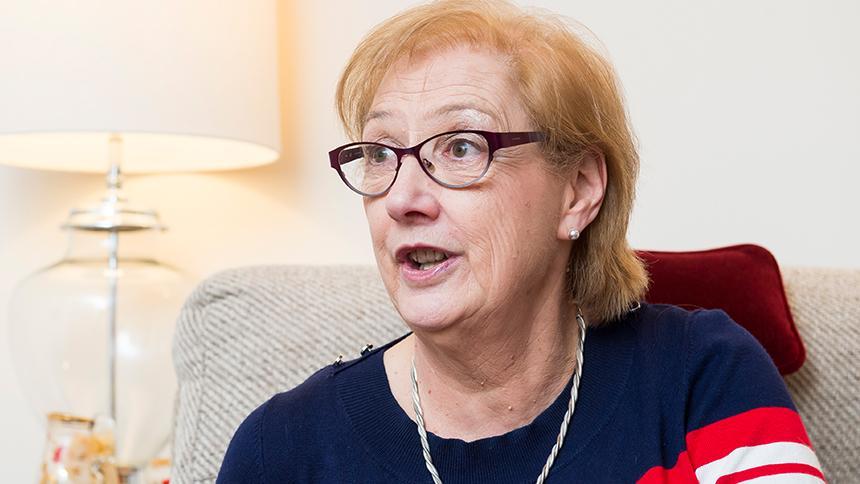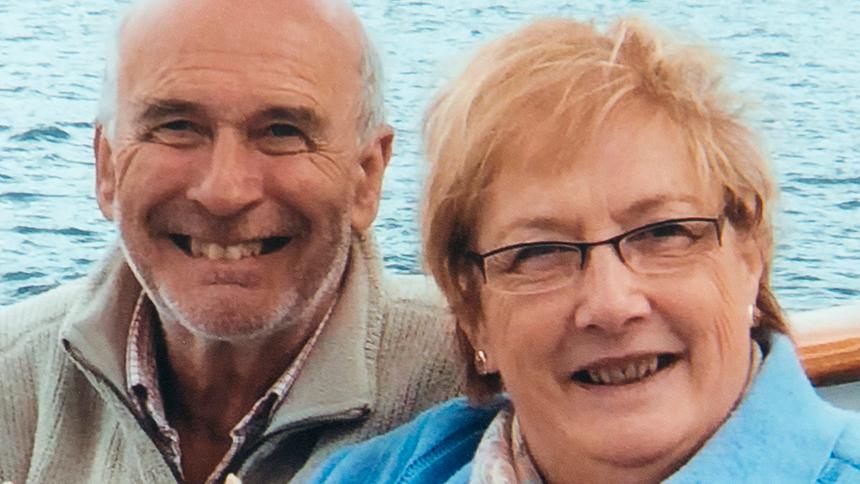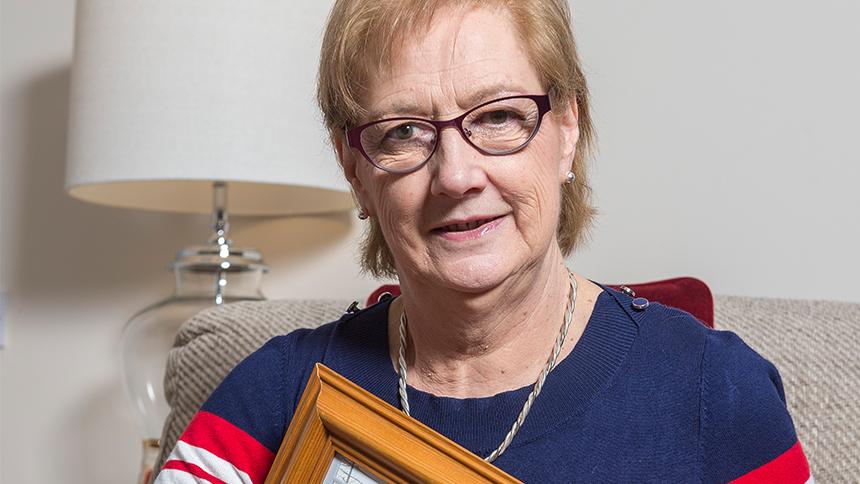Feel the love: A carer reflects on her greatest challenge
We meet Pat Collard who supported her husband from his dementia diagnosis to his death.
Diagnosed with dementia back in 2013, Pat Collard's husband, Mick, died just before Christmas last year.
'The funeral was a celebration of Mick's life and went better than we could have hoped for.
'The celebrant said you could feel the love that day,' says Pat, who lives in Cottingham in Hull.
For Pat, 68, it concluded a story that had begun some 50 years earlier.

Pat Collard lost her closest companion
Family man
Pat, who left Scotland as a teenager, met Mick in early 1968 at college in Hertfordshire. They married in 1970, the week after Pat completed her teacher training.
They lived in various parts of Essex – with a two-year spell in Antwerp, Belgium sandwiched in between – before settling up north in more recent times.
Pat worked as a teacher before moving into the local authority's education advisory service, while Mick was a research engineer for telecoms firms including Marconi.
The couple had two sons, both now in their 40s, as well as grandchildren.
'Mick loved his work but it was never his reason for living,' says Pat. 'His immediate family was always most important.'
A passion of Mick's was their 15th century home in Felsted, Essex, which he spent 20 years restoring in his spare time. The couple also enjoyed travelling and had many memorable holidays together at home and abroad.
Dementia denial
It was back in 2009 or 2010 that Mick began having difficulty with finding words – he could describe certain objects or items, but not actually name them.
'I now realise he was telling the GP that he was having problems remembering people's names. He wasn't being honest,' says Pat.
'So of course the GP said there was nothing to worry about and it was normal. He had an element of denial because he could still do everything else. He maintained such a good memory and a brilliant sense of direction for a long time.'
Eventually a clinical psychologist diagnosed Mick with aphasia, where someone experiences problems using language correctly.
'We compiled an email for friends and put the decision to them as to whether they wanted to continue on our path – nobody rejected us,' says Pat.
Mick had further tests at the Cerebral Function Unit in Manchester, which led to a diagnosis of atypical Alzheimer's disease in 2013.
The couple decided to tell people about Mick's dementia so they could better understand his behaviour.
'We compiled an email for friends and put the decision to them as to whether they wanted to continue on our path – nobody rejected us,' says Pat.
As Mick's dementia progressed, he lost the ability to write as well as his understanding of numbers and money.
'You slide into them being less able and you doing more things for them,' says Pat.

Pat's husband Mick was diagnosed with atypical Alzheimer's
No man's land
Pat wanted to get any support she could, and started going to an Alzheimer's Society memory café with Mick. However, it proved more useful for herself than her husband.
'I found it interesting and helpful, and it meant I found out about the Carer Information and Support Programme (CrISP), which is a brilliant course,' she says.
'But Mick asked, "What are we doing here?", because other attendees had more advanced dementia, so the activities were more suited to them. Mick couldn't join in the carer chat either, so he was in no man's land.'
More useful to Mick was something that has since developed into our Side by Side service. This paired him with a local volunteer for enjoyable trips to museums and drives in the car.
Pat also took advantage of a free local service providing replacement (or respite) home care, and employed a private carer to take Mick out.
Hardest day
In May 2017, Pat was offered replacement care for Mick at Woodleigh Manor, a nearby care home.
'The impact of that was huge, as it made me realise what our "normal" had become,' she says.
'I realised that life in the outside world had become too difficult for Mick, so while I thought I was doing the right thing in keeping him at home, it was making it difficult for him.'
The following month, Pat accepted a permanent place for Mick at Woodleigh Manor.
'I always said that Mick would never go into residential care to make my life easier – it would always be about him, not me,' she says.
'On 5 June 2017, I took him. It was probably the hardest day of my life. He didn't know he was going and I couldn't tell him.
'Everything in my brain said I couldn't do it, but I kept packing the case. It was really hard.
'He had no idea he would never be coming home again, ever. That's a momentous thing to do.'
Pat visited the home regularly and took Mick out for trips.
'He couldn't name me, but he knew me and knew our relationship,' she says.
From October, Mick needed end of life care and he died on 22 December, aged 71.
'The funeral was the day before the 50th anniversary of the day we met. That somehow seemed to close a circle,' says Pat.

Pat understands how dementia changes relationships
Lost love
Pat speaks openly about the impact that dementia had on her and Mick's relationship.
'Our working lives were separate, but apart from that we did everything together. We learned to be adults together, dealt with the issues of life together. But dementia drives a horse and cart through the partnership aspect of togetherness,' she says.
'As dementia progressed, it changed to "carer" and "cared for". I was a wife who cared, then a carer. Towards the end, there was no aspect of wife left. I was married but I was a "midow" – a married widow – a term I saw on Alzheimer's Society's online community, Talking Point.
'The biggest issue was that the one person I had always been able to turn to was the one person I couldn't discuss the biggest challenge of my life with,' says Pat.
'I feel selfish saying it, but I lost my freedom. I lost companionship. I lost support. And ultimately I lost his love as it had been – a very caring love.
'The biggest issue was that the one person I had always been able to turn to was the one person I couldn't discuss the biggest challenge of my life with.'
Dementia Support Forum
As well as sharing her story with us, Pat has spoken at a dementia conference and taken part in interview panels for new staff at Alzheimer's Society.
She says this is a way of 'taking a shot back at dementia' and regaining some of the control that the condition and its progression took away.
As she reflects on the challenges of recent years, Pat recalls a vow that she and Mick made following his diagnosis.
'We agreed that we would not let fear of the future take away our present,' she says.
'It was a hard one, but I think we managed it.'
Next steps
- Join Talking Point, our online community.
- See our range of publications about caring for a person with dementia.
- Find dementia services near you.

